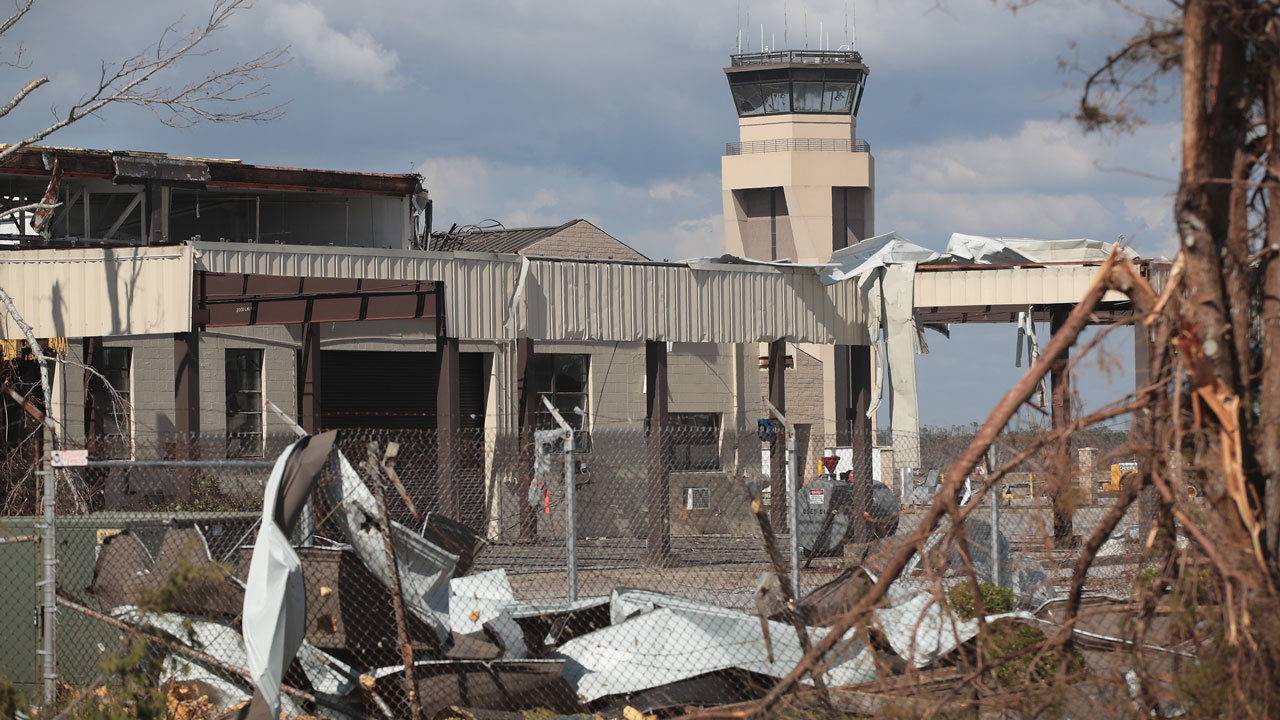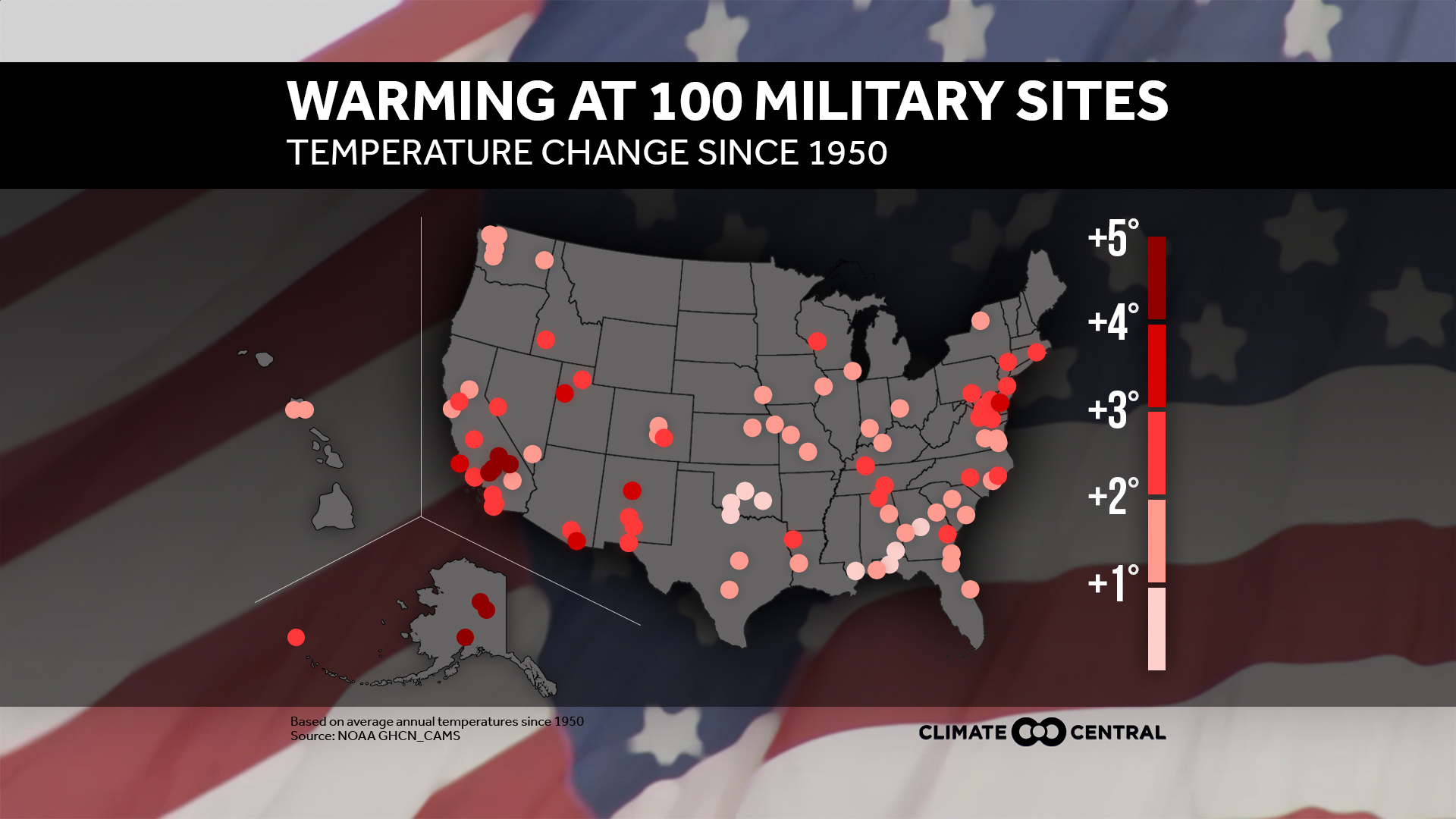
Debris litters Tyndall Air Force Base following 2018 hurricane.
How the Pentagon Is Planning for Climate Change
Alex Ward / Vox
(February 24, 2020) — Extreme temperatures. Collapsing countries. Wars on multiple continents. Simultaneous natural disasters. And a US military completely unprepared to deal with it all.
Welcome to all hell breaking loose.
That’s not the plot of some apocalyptic novel — it’s a scenario the Pentagon is deeply concerned could happen in the not-so-distant future due to climate change.
Over the past decade, the Pentagon has consistently, repeatedly cited climate change as a serious threat to America’s national security in official public documents.
A new book, aptly titled All Hell Breaking Loose: The Pentagon’s Perspective on Climate Change, reveals the Pentagon is far more worried about the potential impacts of climate change than most probably realize. The good news is that it’s doing a lot to develop ways of coping with that uncertain future. The bad news is that it still may not be enough.
I called up the book’s author, Michael Klare, to find out more about what the US military is so worried about, what it’s trying to do about it, and whether any of it will be enough to mitigate the coming challenges.
Our conversation, edited for length and clarity, is below.

Alex Ward
Walk me through why the Pentagon is so intensely focused on climate change.
Michael Klare
I tried to present this as best as I could from the perspective of people in the military, based on interviews and reading documents and attending conferences at the military academies.
Climate change is a threat in their eyes because it’s going to degrade their ability to deal with conventional military problems. It’s going to create chaos, violence, mass migrations, pandemics, and state collapse around the world, particularly in vulnerable areas like Africa and the Middle East.
At the same time, the military’s own bases are very vulnerable to the effects of climate change because of rising seas and forest fires, storms, and floods.
Climate change, then, represents a threat to American armed forces because it’s going to interfere with their ability to carry out their job. And therefore, it’s a threat to national security.
A military police officer walks near a destroyed gate on October 12, 2018, at Tyndall Air Force Base in Florida during the aftermath of Hurricane Michael. Brendan Smialowski/AFP via Getty Images
Alex Ward
Since you’ve gone through the record, when was the first time the US military went, “Hey, this climate change thing could be a problem for us”?
Michael Klare
The first time they officially said that was in 2010. The Department of Defense every four years issues what they call a Quadrennial Defense Review, which is a summary of the major threats as they see them and what they have to do to face them.
Whereas the 2006 edition was entirely about terrorism, the 2010 version specifically identified climate change as a threat to national security and the ability of the military to carry out its functions.
The report also called for the military to take proactive measures to reduce that threat in two ways. First, to better bolster defenses of their own facilities at home. Second — and very strikingly, I think — it called on the US military to cooperate with foreign forces to increase their abilities to cope with the effects of climate change.
The Pentagon under the Obama administration, then, saw this very clearly as a global problem, not just an American problem.
Alex Ward
2010 seems pretty late for the Pentagon to say that climate change could prove a national security problem. Were other militaries already considering climate change in their defense plans?
Michael Klare
I can’t say that I know the answer to that, whether others were taking it seriously before America.
But I think the Pentagon moved pretty quickly, once officials made up their minds, and once this became official doctrine. Once it was in the Quadrennial Defense Review, that meant that the entire military was obligated by official doctrine to move on this issue. Every part of the institution, every military service, every component command was obliged to take action.
So once that decision was made, no other military moved on the same scale, the same magnitude, as the US military did.

Floods overwhelm US Stratigic Command.
Alex Ward
Can you give me some examples of what actions the military actually took?
Michael Klare
Among other things, there was a commitment to reduce the military’s reliance on fossil fuelsthat began that year. And there’s something called the Strategic Sustainability Plan, which calls for each of the military services to reduce that reliance by a certain percentage each year, and to increase their reliance on renewable sources of energy. Every military base, every installation, every part of the military was obliged to move in that direction.
Some parts of the military moved faster than others. The Navy in particular took leadership under Secretary Ray Mabus, who led the service from 2009 to 2017. He created something called the Great Green Fleet, a 2016 plan to send an entire fleet into the Pacific powered by alternative energy sources. The Great Green Fleet was to demonstrate to the world that the US was taking leadership in alternative energy supplies.
The logo for the Great Green Fleet initiative. US Navy
Alex Ward
Does that continue today?
Michael Klare
Yes, Navy officials continue to insist that future vessels be extremely energy-efficient. Meanwhile, bases all over the US are building solar panels and reducing their fossil fuel use on a very large scale, probably more than any other institution in the United States.
Alex Ward
As you know, the Republican Party champions the military all the time. What it hasn’t championed, though, is climate change as a serious issue. Why hasn’t the party come along with the military’s views on climate change, given it will pose such a threat to the armed forces they care so much about?
Michael Klare
There are two things going on. One, of course, is the military is not an environmental organization. It doesn’t go around and campaign for environmental activism or environmental change. It’s not like they’re out there bragging about all of this stuff that I’m telling you about. I wish more people knew what they were doing.
Second, there actually are Republicans paying attention to all this, particularly in areas of the country where military installations are at risk and that are heavily populated.
A clear example of that is in Norfolk, Virginia. Norfolk Naval Station is the largest naval base in the world, and the leading base for the US Navy. It houses something like six aircraft carriers and dozens of other warships right on the edge of the Atlantic in Chesapeake Bay. It’s very vulnerable to sea level rise and to storm surge when there are hurricanes.
The areas around the base are largely areas that vote Republican. Because it and other nearby installations are suffering from the same threats, there’s been close cooperation between the military facility and the surrounding communities to take steps to defend against the growing impacts of climate change.
Alex Ward
Is that just happening in Norfolk?
Michael Klare
No, the same thing is happening in San Diego, where there’s a heavy concentration of naval bases, as well as in Florida, where local Republican representatives are joining in these efforts.
And out of this has come something called the Climate Solutions Caucus in Congress, which is totally bipartisan, half Republicans and half Democrats. It’s premised on the agreement that climate change poses a national security threat to the United States, and the aim is to search for measures to address the problem. Some of these measures are beginning to make their way into legislation.
But, mind you, they’re not using the language an environmentalist movement would have. It doesn’t condemn fossil fuel companies, for example.

US Navy evacuates from Naval Station Norfolk in path of Hurricane Florence in 2018.
Alex Ward
Is the military changing where it operatesbecause of climate change, or is it buying new types of equipment?
Michael Klare
That’s a very interesting question. The military is starting to adjust based on rising heat. The predictions are that temperatures in the Middle East before very long will routinely reach around 100 degrees Fahrenheit for long stretches during daylight hours in the summer.
We can’t send American troops into those conditions carrying 60 to 70 pounds on their backs along with heavy clothing and protective gear, too. That’s lethal for anybody who goes outside in those conditions.
The military therefore has to rethink its equipment. Even some helicopters struggle in those temperatures!
Another adjustment that’s been happening — and here, the Marines have taken a leadership role — is how to deploy forces in areas where there’s no water, and where supplying them with oil is very dangerous.
This was experienced in Afghanistan, where the most dangerous mission you could be assigned to was to escort convoys of oil tankers to remote posts in the countryside. Those convoys were always ambushed by the Taliban. The same thing happened in Iraq.
So the Marines in particular have been seeking how to make their equipment and bases less fossil fuel-dependent. The military even developed folding solar arrays that you can carry in your backpack and then put over your tents to power your batteries for your radios, and make them independent of resources that otherwise would have to be carried under hazardous conditions.
Alex Ward
That seems like a lot of progress. Where has the military fallen behind on dealing with climate change?
Michael Klare
The biggest problem, I think, is that none of these important initiatives to deal with climate change are happening fast enough. An awful lot of US military bases are highly exposed and are at great risk from the effects of climate change. Virtually every East Coast naval base is eventually going to be underwater, and nobody is willing to say out loud what the cost of relocation is going to be.
For example, the Naval Academy at Annapolis is already flooded on a regular basis, and it won’t be long before that will be underwater year-round. Even though people in the Navy are aware of this, the magnitude of the threat is so great that nobody is willing to say out loud what really has to be done to address it.
Alex Ward
Would you say that climate change is the No. 1 threat to the US military at the moment?
Michael Klare
The title of my book is All Hell Breaking Loose, and what that refers to is a time in the not-too-distant future. Not right away, but 10, 20 years down the line when all these horrible things are going to start happening simultaneously. The collapse of major states, like Pakistan, India, the Philippines, Nigeria, Saudi Arabia.
It’s very clear from the literature that people in the Defense Department and in the intelligence community are aware that all of this is going to happen.
What happens when you have states collapsing, multiple wars happening in the Middle East and Africa and South America, and many hurricanes and disasters in the United States all at the same time? The US military doesn’t have enough troops or resources to both defend the United States and to address all of these foreign catastrophes. That’s what I call an all-hell-breaking-loose scenario, and the Pentagon knows very well that US forces aren’t prepared or capable to deal with it.
Alex Ward
That sounds bad, Michael.
Michael Klare
Yeah, and we’re all going to face this.
Posted in accordance with Title 17, Section 107, US Code, for noncommercial, educational purposes.